Take a good look at this map of the Great Lakes watershed:

I'd like to call your attention to that state right smack dab in the middle of it. The state that is ENTIRELY within the Great Lakes watershed. Entirely. I call it home. Others call it Michigan.
Okay...so what does that mean? A watershed is wider area from which drainage converges to meet in another shared area. Imagine it like a funnel. Dump water anywhere in that funnel, it's all going to converge in the center. The funnel is the watershed for the center of the funnel. Or, for example, if you dump oil into the funnel, all that oil is also going to wind up in the center of that funnel.
So....more specific to Lake Michigan, the entirety of West Michigan is the drainage basin, or watershed, for Lake Michigan.
Here's a game: Dump water on the ground in West Michigan, it's going to either evaporate or end up in Lake Michigan.
Now let's try something else. Let's say you dump Vernor's ginger ail on the ground. Dump a Vernor's on the ground, it's going to either evaporate or it's going to wind up in Lake Michigan.
Get how this works?
Now let's try crude oil. Dump crude oil on the ground, whatever doesn't evaporate (yes, it does evaporate), is going to end up............
......altogether now.....IN LAKE MICHIGAN.
So...back to those oil prospectors.
Oil companies are sniffing around West Michigan for oil.
In recent months, landowners throughout Muskegon, Oceana, Newaygo and Mason counties have been approached by companies from as far away as Texas looking to lease mineral rights.
And
Imagine this scenario: An energy company thinks there might be untapped resources below your land and wants to pay $35 to $150 per acre for your permission to explore for oil and gas.
Do you even know where to start asking questions? If not, you’re not alone.
Because more landowners throughout West Michigan are being approached by companies with offers to lease the mineral rights to their property, state regulators and university leaders are holding an information meeting to help ensure more property owners enter those negotiations armed with a better understanding.
It wasn't too long ago that environmentalists and a congressman named Bart Stupak championed a Great Lakes Drilling Ban in 2003, which helped to end over 25 years of drilling for oil under Lake Michigan. Article
We don't have the likes of Bart Stupak around anymore. He's been replaced with some tow-the-line Conservative dude who definitely won't lift a finger to protect our waters if it's oil companies looking to muck around here.
See, Michigan once had plans of really capitalizing on its natural gas and oil currently under the Great Lakes. And for a while, they did. They used used something known as slant drilling....setting the rig on land and then drilling down, slantwise, under the lake. And they could claim it wasn't TECHNICALLY offshore drilling.
But I'm not exactly sure what the difference is........if you're perched atop the drainage basin, anyway. There's very little difference in the case of spillage. It's going to get into Lake Michigan. Drilling near the shoreline...drilling within the watershed....is little removed from to drilling within the water itself.
I'm not sure what's brought on this sudden interest in lakeshore communities as a great place to prospect for oil...but I have my suspicions it's an attempt to try to get back the days of slant drilling for oil and gas under Lake Michigan
No comments:
Post a Comment